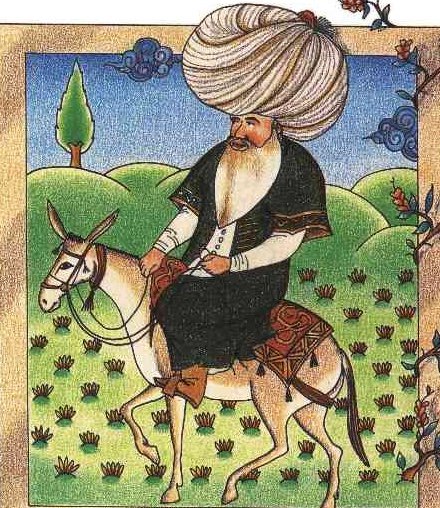Tickling Funny Bones: Entertaining Tales of Molla Nasreddin
Humor has always been a powerful tool to bring people together, and one legendary figure who excelled in this art was Molla Nasreddin. Known for his witty sayings and comical antics, Nasreddin was a beloved character in the ancient Persian world. His tales have traveled through time, tickling funny bones and bringing laughter to people of all ages and cultures. So, let’s embark on a journey to explore the entertaining tales and enduring legacy of Molla Nasreddin.

Meet the Legend: Molla Nasreddin, a Comical Sufi Fool
Molla Nasreddin was no ordinary jester. Unlike the jesters of medieval Europe, Nasreddin was a Persian Sufi, a mystic who used humor to teach profound life lessons. Born in the 13th century in the city of Sivrihisar, Turkey, he was renowned for his quick wit and sharp tongue. Nasreddin’s tales often revolve around his interactions with the people of his village, where he would play the role of a foolish yet wise comical figure.
From Ancient Persia to Modern Laughter: The Legacy Lives On
Despite being centuries old, Nasreddin’s tales continue to captivate audiences across the globe. His stories have transcended time and have been adapted into various forms, including books, plays, and cartoons. From ancient Persia to modern-day comedy clubs, Nasreddin’s legacy lives on, spreading laughter like wildfire.
Hilarious Hijinks: Molla Nasreddin’s Mischievous Exploits
Nasreddin was notorious for his mischievous escapades. Whether it was outsmarting a greedy merchant or tricking a foolish neighbor, his clever antics never failed to amuse. One of his famous exploits involves pretending to be dead and lying in a coffin, only to burst out laughing when the mourners gathered around him. Nasreddin’s hilarious hijinks were a constant source of entertainment and laughter for those around him.
Political Satire with a Twist: Nasreddin’s Witty Wisdom
Nasreddin’s tales often contained subtle political satire, making him a master of wit and wisdom. Through his stories, he cleverly critiqued the rulers and authorities of his time. In one tale, Nasreddin mounted his donkey backwards, claiming he was following the advice of the king. When questioned, he explained that the king had advised him to always go against the crowd, and since everyone else rode their donkeys facing forward, he chose to do the opposite.
Laughter for All: Nasreddin’s Stories Transcend Time and Culture
The beauty of Nasreddin’s tales lies in their universal appeal. Regardless of language or cultural barriers, his stories elicit laughter and bring people together. Nasreddin’s wit and humor resonate with people from all walks of life, reminding us that laughter is a language that knows no borders.
Cultural Insights Wrapped in Humor: Nasreddin’s Lessons
Nasreddin’s tales not only entertain but also offer valuable life lessons. Through his comical exploits, he often exposed the follies of human behavior and taught important moral values. His stories touched on topics such as honesty, greed, and the importance of thinking outside the box. Nasreddin’s humorous tales served as a bridge between entertainment and education.
The Wise Fool: How Nasreddin’s Foolishness Hides Wisdom
Nasreddin’s foolishness was not a display of stupidity but rather a mask that concealed his wisdom. By adopting the role of a fool, he could communicate profound truths in a lighthearted manner. Nasreddin’s witty remarks and clever comebacks allowed him to challenge social norms and question authority without facing repercussions. He used humor as a shield to deliver his insightful messages.
Laughter as Social Commentary: Nasreddin’s Subversive Humor
Nasreddin’s humor was not just about making people laugh; it was a form of social commentary. Through his tales, he subtly criticized the hypocrisies and injustices of the society he lived in. He challenged the status quo and encouraged people to question the norms that held them back. Nasreddin’s subversive humor was a tool for change, encouraging individuals to think critically and challenge oppressive systems.
Nasreddin’s Proverbs: Pithy Sayings That Pack a Punch
Beyond his comical tales, Nasreddin’s legacy also includes a collection of pithy proverbs that have become popular sayings in many cultures. These proverbs, often peppered with humor, pack a punch of wisdom. One of his famous proverbs advises, “Do not look for a black cat in a dark room, especially if there is no cat.” These sayings continue to be shared and quoted, offering timeless wisdom wrapped in humor.
The Wit of Nasreddin: Unraveling the Secrets of a Jester
Nasreddin’s wit was not just a product of clever thinking, but also a reflection of his deep understanding of human nature. He had a knack for identifying the absurdities and contradictions within society and using them to create humorous stories. His ability to unravel the secrets of a jester made him a true master of the art of comedy.
Celebrating Nasreddin: Humor That Bridges Divides
Molla Nasreddin’s tales remind us of the power of laughter to bridge divides, transcend time, and teach valuable lessons. His stories continue to entertain and enlighten people around the world. So, let us celebrate the legacy of this comical Sufi fool and keep his spirit alive, tickling funny bones wherever we go.
